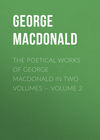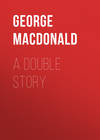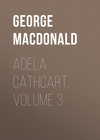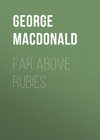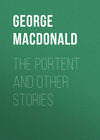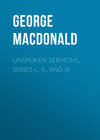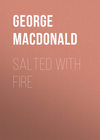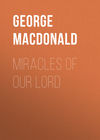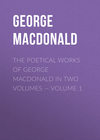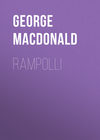Read the book: «The poetical works of George MacDonald in two volumes — Volume 2», page 17
Font:
THE GOAL
In God alone, the perfect end,
Wilt thou find thyself or friend.
THE HEALER
They come to thee, the halt, the maimed, the blind,
The devil-torn, the sick, the sore;
Thy heart their well of life they find,
Thine ear their open door.
Ah, who can tell the joy in Palestine—
What smiles and tears of rescued throngs!
Their lees of life were turned to wine,
Their prayers to shouts and songs!
The story dear our wise men fable call,
Give paltry facts the mighty range;
To me it seems just what should fall,
And nothing very strange.
But were I deaf and lame and blind and sore,
I scarce would care for cure to ask;
Another prayer should haunt thy door—
Set thee a harder task.
If thou art Christ, see here this heart of mine,
Torn, empty, moaning, and unblest!
Had ever heart more need of thine,
If thine indeed hath rest?
Thy word, thy hand right soon did scare the bane
That in their bodies death did breed;
If thou canst cure my deeper pain
Then art thou lord indeed.
OH THAT A WIND
Oh that a wind would call
From the depths of the leafless wood!
Oh that a voice would fall
On the ear of my solitude!
Far away is the sea,
With its sound and its spirit tone;
Over it white clouds flee;
But I am alone, alone.
Straight and steady and tall
The trees stand on their feet;
Fast by the old stone wall
The moss grows green and sweet;
But my heart is full of fears,
For the sun shines far away;
And they look in my face through tears,
And the light of a dying day.
My heart was glad last night
As I pressed it with my palm;
Its throb was airy and light
As it sang some spirit psalm;
But it died away in my breast
As I wandered forth to-day,—
As a bird sat dead on its nest,
While others sang on the spray.
O weary heart of mine,
Is there ever a Truth for thee?
Will ever a sun outshine
But the sun that shines on me?
Away, away through the air
The clouds and the leaves are blown;
And my heart hath need of prayer,
For it sitteth alone, alone.
A VISION OF ST. ELIGIUS
I
I see thy house, but I am blown about,
A wind-mocked kite, between the earth and sky,
All out of doors—alas! of thy doors out,
And drenched in dews no summer suns can dry.
For every blast is passion of my own;
The dews cold sweats of selfish agony;
Dank vapour steams from memories lying prone;
And all my soul is but a stifled cry.
II
Lord, thou dost hold my string, else were I driven
Down to some gulf where I were tossed no more,
No turmoil telling I was not in heaven,
No billows raving on a blessed shore.
Thou standest on thy door-sill, calm as day,
And all my throbs and pangs are pulls from thee;
Hold fast the string, lest I should break away
And outer dark and silence swallow me.
III
No longer fly thy kite, Lord; draw me home.
Thou pull'st the string through all the distance bleak;
Lord, I am nearing thee; O Lord, I come;
Thy pulls grow stronger and the wind grows weak.
In thy remodelling hands thou tak'st thy kite;
A moment to thy bosom hold'st me fast.
Thou flingest me abroad:—lo, in thy might
A strong-winged bird I soar on every blast!
OF THE SON OF MAN
I. I honour Nature, holding it unjust
To look with jealousy on her designs;
With every passing year more fast she twines
About my heart; with her mysterious dust
Claim I a fellowship not less august
Although she works before me and combines
Her changing forms, wherever the sun shines
Spreading a leafy volume on the crust
Of the old world; and man himself likewise
Is of her making: wherefore then divorce
What God hath joined thus, and rend by force
Spirit away from substance, bursting ties
By which in one great bond of unity
God hath together bound all things that be?
II. And in these lines my purpose is to show
That He who left the Father, though he came
Not with art-splendour or the earthly flame
Of genius, yet in that he did bestow
His own true loving heart, did cause to grow,
Unseen and buried deep, whate'er we name
The best in human art, without the shame
Of idle sitting in most real woe;
And that whate'er of Beautiful and Grand
The Earth contains, by him was not despised,
But rather was so deeply realized
In word and deed, though not with artist hand,
That it was either hid or all disguised
From those who were not wise to understand.
III. Art is the bond of weakness, and we find
Therein acknowledgment of failing power:
A man would worship, gazing on a flower—
Onward he passeth, lo his eyes are blind!
The unenlivened form he left behind
Grew up within him only for an hour!
And he will grapple with Nature till the dower
Of strength shall be retreasured in his mind.
And each form-record is a high protest
Of treason done unto the soul of man,
Which, striving upwards, ever is oppress'd
By the old bondage, underneath whose ban
He, failing in his struggle for the best,
Must live in pain upon what food he can.
IV. Moreover, were there perfect harmony
'Twixt soul and Nature, we should never waste
The precious hours in gazing, but should haste
To assimilate her offerings, and we
From high life-elements, as doth the tree,
Should grow to higher; so what we call Taste
Is a slow living as of roots encased
In the grim chinks of some sterility
Both cramping and withholding. Art is Truth,
But Truth dammed up and frozen, gagged and bound
As is a streamlet icy and uncouth
Which pebbles hath and channel but no sound:
Give it again its summer heart of youth
And it will be a life upon the ground.
V. And Love had not been prisoned in cold stone,
Nor Beauty smeared on the dead canvas so,
Had not their worshipper been forced to go
Questful and restless through the world alone,
Searching but finding not, till on him shone
Back from his own deep heart a chilly glow
As of a frost-nipped sunbeam, or of snow
Under a storm-dodged crescent which hath grown
Wasted to mockery; and beneath such gleam
His wan conceits have found an utterance,
Which, had they found a true and sunny beam,
Had ripened into real touch and glance—
Nay more, to real deed, the Truth of all,
To some perfection high and personal.
VI. "But yet the great of soul have ever been
The first to glory in all works of art;
For from the genius-form would ever dart
A light of inspiration, and a sheen
As of new comings; and ourselves have seen
Men of stern purpose to whose eyes would start
Sorrow at sight of sorrow though no heart
Did riot underneath that chilly, screen;
And hence we judge such utterance native to
The human soul—expression highest—best."
—Nay, it is by such sign they will pursue,
Albeit unknowing, Beauty, without rest;
And failing in the search, themselves will fling
Speechless before its shadow, worshipping.
VII. And how shall he whose mission is to bring
The soul to worship at its rightful shrine,
Seeing in Beauty what is most divine,
Give out the mightiest impulse, and thus fling
His soul into the future, scattering
The living seed of wisdom? Shall there shine
From underneath his hand a matchless line
Of high earth-beauties, till the wide world ring
With the far clang that tells a missioned soul,
Kneeling to homage all about his feet?
Alas for such a gift were this the whole,
The only bread of life men had to eat!
Lo, I behold them dead about him now,
And him the heart of death, for all that brow!
VIII. If Thou didst pass by Art, thou didst not scorn
The souls that by such symbol yearned in vain
From Truth and Love true nourishment to gain:
On thy warm breast, so chilly and forlorn
Fell these thy nurslings little more than born
That thou wast anguished, and there fell a rain
From thy blest eyelids, and in grief and pain
Thou partedst from them yet one night and morn
To find them wholesome food and nourishment
Instead of what their blindness took for such,
Laying thyself a seed in earthen rent
From which, outspringing to the willing touch,
Riseth for all thy children harvest great,
For which they will all learn to bless thee yet.
IX. Thou sawest Beauty in the streaking cloud
When grief lift up those eyelids; nor in scorn
Broke ever on thine eyes the purple morn
Along the cedar tops; to thee aloud
Spake the night-solitude, when hushed and bowed
The earth lay at thy feet stony and worn;
Loving thou markedst when the lamb unshorn
Was glad before thee, and amongst the crowd
Famished and pent in cities did thine eye
Read strangest glory—though in human art
No record lives to tell us that thy heart
Bowed to its own deep beauty: deeper did lie
The burden of thy mission, even whereby
We know that Beauty liveth where Thou art.
X. Doubtless thine eyes have watched the sun aspire
From that same Olivet, when back on thee
Flushed upwards after some night-agony
Thy proper Godhead, with a purer fire
Purpling thy Infinite, and in strong desire
Thou sattest in the dawn that was to be
Uplifted on our dark perplexity.
Yea in thee lay thy soul, a living lyre,
And each wild beauty smote it, though the sound
Rung to the night-winds oft and desert air;
Beneath thine eyes the lily paled more fair,
And each still shadow slanting on the ground
Lay sweetly on thee as commissioned there,
So full wast thou of eyes all round and round.
XI. And so thou neededst not our human skill
To fix what thus were transient—there it grew
Wedded to thy perfection; and anew
With every coming vision rose there still
Some living principle which did fulfil
Thy most legitimate manhood; and unto
Thy soul all Nature rendered up its due
With not a contradiction; and each hill
And mountain torrent and each wandering light
Grew out divinely on thy countenance,
Whereon, as we are told, by word and glance
Thy hearers read an ever strange delight—So
strange to them thy Truth, they could not tell
What made thy message so unspeakable.
XII. And by such living witness didst thou preach:
Not with blind hands of groping forward thrust
Into the darkness, gathering only dust,
But by this real sign—that thou didst reach,
In natural order, rising each from each,
Thy own ideals of the True and Just;
And that as thou didst live, even so he must
Who would aspire his fellow-men to teach,
Looking perpetual from new heights of Thought
On his old self. Of art no scorner thou!
Instead of leafy chaplet, on thy brow
Wearing the light of manhood, thou hast brought
Death unto Life! Above all statues now,
Immortal Artist, hail! thy work is wrought!
XIII. Solemn and icy stand ye in my eyes,
Far up into the niches of the Past,
Ye marble statues, dim and holden fast
Within your stony homes! nor human cries
Had shook you from your frozen phantasies
Or sent the life-blood through you, till there passed
Through all your chilly bulks a new life-blast
From the Eternal Living, and ye rise
From out your stiffened postures rosy-warm,
Walking abroad a goodly company
Of living virtues at that wondrous charm,
As he with human heart and hand and eye
Walked sorrowing upon our highways then,
The Eternal Father's living gift to men!
XIV. As the pent torrent in uneasy rest
Under the griping rocks, doth ever keep
A monstrous working as it lies asleep
In the round hollow of some mountain's breast,
Till where it hideth in its sweltering nest
Some earthquake finds it, and its waters leap
Forth to the sunshine down the mighty steep,
So in thee once was anguished forth the quest
Whereby man sought for life-power as he lay
Under his own proud heart and black despair
Wedged fast and stifled up with loads of care,
Yet at dumb struggle with the tyrant clay;
Thou wentest down below the roots of prayer,
And he hath cried aloud since that same day!
XV. As he that parts in hatred from a friend
Mixing with other men forgets the woe
Which anguished him when he beheld and lo
Two souls had fled asunder which did bend
Under the same blue heaven! yet ere the end,
When the loud world hath tossed him to and fro,
Will often strangely reappear that glow
At simplest memory which some chance may send,
Although much stronger bonds have lost their power:
So thou God-sent didst come in lowly guise,
Striking on simple chords,—not with surprise
Or mightiest recollectings in that hour,
But like remembered fragrance of a flower
A man with human heart and loving eyes.
March, 1852.
A SONG-SERMON:
Job xiv. 13-15.
RONDEL
Would that thou hid me in the grave
And kept me with death's gaoler-care;
Until thy wrath away should wear
A sentence fixed thy prisoner gave!
I would endure with patience brave
So thou remembered I was there!
Would that thou hid me in the grave,
And kept me with death's gaoler-care!
To see thy creature thou wouldst crave—
Desire thy handiwork so fair;
Then wouldst thou call through death's dank air
And I would answer from the cave!
Would that thou hid me in the grave,
And kept me with death's gaoler-care!
WORDS IN THE NIGHT
I woke at midnight, and my heart,
My beating heart, said this to me:
Thou seest the moon, how calm and bright!
The world is fair by day and night,
But what is that to thee?
One touch to me, down dips the light
Over the land and sea.
All is mine, all is my own!
Toss the purple fountain high!
The breast of man is a vat of stone;
I am alive, I, only I!
One little touch and all is dark—
The winter with its sparkling moons,
The spring with all her violets,
The crimson dawns and rich sunsets,
The autumn's yellowing noons!
I only toss my purple jets,
And thou art one that swoons
Upon a night of gust and roar,
Shipwrecked among the waves, and seems
Across the purple hills to roam:
Sweet odours touch him from the foam,
And downward sinking still he dreams
He walks the clover fields at home
And hears the rattling teams.
All is mine, all is my own!
Toss the purple fountain high!
The breast of man is a vat of stone;
I am alive, I, only I!
Thou hast beheld a throated fountain spout
Full in the air, and in the downward spray
A hovering Iris span the marble tank,
Which, as the wind came, ever rose and sank,
Violet and red; so my continual play
Makes beauty for the Gods with many a prank
Of human excellence, while they,
Weary of all the noon, in shadows sweet,
Supine and heavy-eyed rest in the boundless heat.
Let the world's fountain play!
Beauty is pleasant in the eyes of Jove;
Betwixt the wavering shadows where he lies
He marks the dancing column with his eyes
Celestial, and amid his inmost grove
Upgathers all his limbs, serenely blest,
Lulled by the mellow noise of the great world's unrest.
One heart beats in all nature, differing
But in the work it works; its doubts and clamours
Are but the waste and brunt of instruments
Wherewith a work is done, or as the hammers
On forge Cyclopean plied beneath the rents
Of lowest Etna, conquering into shape
The hard and scattered ore;
Choose thou narcotics, and the dizzy grape
Outworking passion, lest with horrid crash
Thy life go from thee in a night of pain;
So tutoring thy vision, shall the flash
Of dove white-breasted be to thee no more
Than a white stone heavy upon the plain.
Hark, the cock crows loud!
And without, all ghastly and ill,
Like a man uplift in his shroud,
The white, white morn is propped on the hill;
And adown from the eaves, pointed and chill
The icicles 'gin to glitter
And the birds with a warble short and shrill
Pass by the chamber-window still—
With a quick, uneasy twitter!
Let me pump warm blood, for the cold is bitter;
And wearily, wearily, one by one,
Men awake with the weary sun!
Life is a phantom shut in thee:
I am the master and keep the key;
So let me toss thee the days of old
Crimson and orange and green and gold;
So let me fill thee yet again
With a rush of dreams from my spout amain;
For all is mine, all is my own:
Toss the purple fountain high!
The breast of man is a vat of stone,
And I am alive, I only, I!
Genres and tags
Age restriction:
12+Release date on Litres:
15 September 2018Volume:
300 p. 1 illustrationCopyright holder:
Public Domain